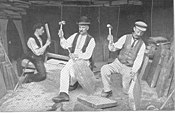Portal:Capitalism
The Capitalism PortalCapitalism is an economic system based on the private ownership of the means of production and their operation for profit. Central characteristics of capitalism include capital accumulation, competitive markets, price systems, private property, property rights recognition, voluntary exchange, and wage labor. In a market economy, decision-making and investments are determined by owners of wealth, property, or ability to maneuver capital or production ability in capital and financial markets—whereas prices and the distribution of goods and services are mainly determined by competition in goods and services markets. Economists, historians, political economists, and sociologists have adopted different perspectives in their analyses of capitalism and have recognized various forms of it in practice. These include laissez-faire or free-market capitalism, anarcho-capitalism, state capitalism, and welfare capitalism. Different forms of capitalism feature varying degrees of free markets, public ownership, obstacles to free competition, and state-sanctioned social policies. The degree of competition in markets and the role of intervention and regulation, as well as the scope of state ownership, vary across different models of capitalism. The extent to which different markets are free and the rules defining private property are matters of politics and policy. Most of the existing capitalist economies are mixed economies that combine elements of free markets with state intervention and in some cases economic planning. Capitalism in its modern form emerged from agrarianism in England, as well as mercantilist practices by European countries between the 16th and 18th centuries. The Industrial Revolution of the 18th century established capitalism as a dominant mode of production, characterized by factory work and a complex division of labor. Through the process of globalization, capitalism spread across the world in the 19th and 20th centuries, especially before World War I and after the end of the Cold War. During the 19th century, capitalism was largely unregulated by the state, but became more regulated in the post–World War II period through Keynesianism, followed by a return of more unregulated capitalism starting in the 1980s through neoliberalism. Market economies have existed under many forms of government and in many different times, places, and cultures. Modern industrial capitalist societies developed in Western Europe in a process that led to the Industrial Revolution. Capitalist economies promote economic growth through accumulation of capital, however a business cycle of economic growth followed by recession is a common characteristic of such economies. (Full article...) Selected article
The slate industry in Wales began during the Roman period when slate was used to roof the fort at Segontium, modern Caernarfon. The slate industry grew slowly until the early 18th century, from when it expanded rapidly and reached its peak output in the late 19th century, at which time the most important slate producing areas were in north-west Wales. These included the Penrhyn Quarry near Bethesda, the Dinorwig Quarry near Llanberis, the Nantlle Valley quarries and Blaenau Ffestiniog, where the slate was mined rather than quarried. Penrhyn and Dinorwig were the two largest slate quarries in the world, and the Oakeley mine at Blaenau Ffestiniog was the largest slate mine in the world. The Great Depression and the Second World War led to the closure of many smaller quarries, and competition from other roofing materials, particularly tiles, resulted in the closure of most of the larger quarries in the 1960s and 1970s. Slate production continues on a much reduced scale. (Full article...)
Selected biography
Paul Anthony Samuelson (May 15, 1915 – December 13, 2009) was an American economist, and the first American to win the Nobel Memorial Prize in Economic Sciences. The Swedish Royal Academies stated, when awarding the prize, that he "has done more than any other contemporary economist to raise the level of scientific analysis in economic theory". Economic historian Randall E. Parker calls him the "Father of Modern Economics", and The New York Times considered him to be the "foremost academic economist of the 20th century".
Samuelson was likely the most influential economist of the later 20th century. In 1996, when he was awarded the National Medal of Science, considered America's top science honor, President Bill Clinton commended Samuelson for his "fundamental contributions to economic science" for over 60 years. Samuelson considered Mathematics to be the natural language for economists and contributed significantly to the mathematical foundations of economics with his book Foundations of Economic Analysis. He was author of the best-selling economics textbook of all time: Economics: An Introductory Analysis, first published in 1948. He served as an advisor to Presidents John F. Kennedy and Lyndon B. Johnson, and was a consultant to the United States Treasury, the Bureau of the Budget and the President's Council of Economic Advisers. Samuelson wrote a weekly column for Newsweek magazine along with Chicago School economist Milton Friedman, where they represented opposing sides: Samuelson, as a self described "Cafeteria Keynesian", took the Keynesian perspective but adapted it accepting what he felt was good. By contrast Friedman represented the monetarist perspective. (Full article...) Selected quote
General imagesThe following are images from various capitalism-related articles on Wikipedia.
Did you know
CategoriesRelated portalsCapitalism topicsCapitalism .. Private property .. Economic freedom .. Laissez-faire .. British Agricultural Revolution .. Industrial Revolution .. Klondike Gold Rush .. Marketplace .. Money .. Wage .. Taxes .. Patent .. Capitalist mode of production .. Criticisms of socialism .. Corporate capitalism .. Democratic capitalism .. Anarcho-capitalism .. State capitalism .. Welfare capitalism .. Adam Smith .. Milton Friedman .. Ludwig Von Mises .. Murray N. Rothbard .. The Wealth of Nations .. The Protestant Ethic and the Spirit of Capitalism .. Capital and Interest .. Capitalism and Freedom .. American capitalism .. Ronald Reagan Things you can do Improve this portal! Associated WikimediaThe following Wikimedia Foundation sister projects provide more on this subject:
Discover Wikipedia using portals |















































